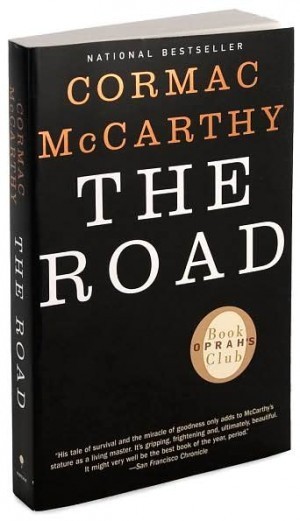Justin Taylor's Blog, page 96
September 4, 2014
Micah Mattix: A Novel Every Christian Should Consider Reading
 I am doing a blog series on Novels Every Christian Should Consider Reading.
I am doing a blog series on Novels Every Christian Should Consider Reading.
Micah Mattix (PhD, University of Fribourg in Switzerland) is assistant professor of literature and writing at Houston Baptist University and a senior contributor at The American Conservative, where he edits Prufrock (a daily newsletter on books, art, and ideas; subscribe here to get it in your inbox).
He divides his time between Ashe County in North Carolina and Houston, and he, his wife, and their four children attend Grace Highlands Presbyterian Church in Boone, NC.
You can follow him on Twitter at @micahmattix.
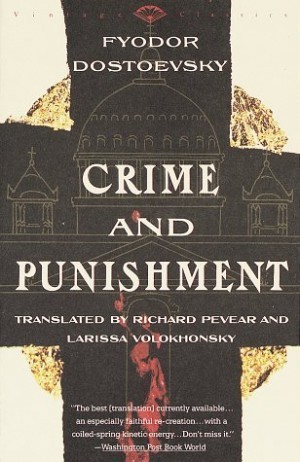 There are lots of reasons to read Fyodor Dostoevsky’s classic Crime and Punishment. The first is that it’s a wonderful piece of art. “At the beginning of July,” the novel opens, “during an extremely hot spell, towards evening, a young man left the closet he rented from tenants in S—y Lane, walked out to the street, and slowly, as if indecisively, headed for the K—n Bridge.” That “as if indecisively” hangs tantalizingly. It foreshadows one of the novel’s major themes—that of self-delusion—and is a useful shorthand for Dostoevsky’s seemingly messy style. The book is a flurry of decisions and indecisions, outbursts, flashbacks, dreams, and wanderings that plunge us into the mind of Raskolnikov—the young man who walked out to the street “as if indecisively,” and who eventually murders two women in his “madness.”
There are lots of reasons to read Fyodor Dostoevsky’s classic Crime and Punishment. The first is that it’s a wonderful piece of art. “At the beginning of July,” the novel opens, “during an extremely hot spell, towards evening, a young man left the closet he rented from tenants in S—y Lane, walked out to the street, and slowly, as if indecisively, headed for the K—n Bridge.” That “as if indecisively” hangs tantalizingly. It foreshadows one of the novel’s major themes—that of self-delusion—and is a useful shorthand for Dostoevsky’s seemingly messy style. The book is a flurry of decisions and indecisions, outbursts, flashbacks, dreams, and wanderings that plunge us into the mind of Raskolnikov—the young man who walked out to the street “as if indecisively,” and who eventually murders two women in his “madness.”
But it’s also a novel of great risk, subtlety, and truth. As Dostoevsky shows, Raskolnikov is not mad in the clinical sense but the spiritual one. The madness is that of pride and the delusion that he is an autonomous being, capable of directing his life toward the ends he chooses. For him, there is no God, and no such thing as good or evil, only suffering and “Freedom and power, but above all, power!” “Away with mirages,” he tells himself, “away with false fears, away with spectres! . . . Now is the kingdom of reason and light and . . . will and strength. . .” It is this unwavering trust in himself and his ability to determine what is right for himself (and others) that leads him to bludgeon two old women for a handful of coins and trinkets to help the poor, he tells himself at one point. In short, Raskolnikov becomes an anti-Christ, very much in the mold of Milton’s Satan, who instead of establishing a kingdom of resurrection and peace, contributes to one of murder and chaos—all in the name of some supposed common good.
In addition to being a novel about delusion, though, it is also one about the absurdity and offensiveness of the Gospel. It has one of the most moving portraits of the Gospel that I know of in literature in the figure of the drunken Marmeladov, who not only fails to provide for his impoverished family because he is always “in his cups,” but steals money from his prostituted 15-year-old daughter to go on a binge. In a moving scene, early in the novel, Marmeladov tells his ugly story to Raskolnikov in a bar:
So, sir, and now I, her blood father, snatched these thirty kopecks for the hair of the dog! And I’m drinking sir! And I’ve already drunk them up, sir! . . . So who’s going to pity the likes of me? Eh?
No one except Christ. Looking forward to Judgment Day, Marmeladov tells Raskolnikov:
On that day, He will come and ask, “Where is the daughter who gave herself for a wicked and consumptive stepmother, for a stranger’s little children? Where is the daughter who pitied her earthly father, a foul drunkard, not shrinking from his beastliness?” And He will say, “Come! I have already forgiven you once . . . I have already forgiven you once . . . And now, too, your many sins are forgiven.” . . . And when He has finished with everyone, then He will say unto us, too, “You, too, come forth!” He will say. “Come forth, my drunk ones, my weak ones, my shameless ones!” . . . And He will say, “Swine you are! Of the image of the beast and of his seal; but come, you, too!”
The response from the bar is derision: “‘Nice reasoning!’ ‘Blather!’ ‘A real official’,” and Raskolnikov, who does not know what to make of Marmeladov, will later express this same sort of disgust. This brief passage doesn’t do the scene justice. If you read the whole thing, it will have you weeping (or extremely angry if you think God saves the good).
The novel also offers a challenge to Christians to mirror the self-sacrificial love of Christ toward the poor, yes, but also towards combative atheists like Raskolnikov. Without giving too much away, Marmeladov’s daughter, Sonya, offers no rational proof of God to Raskolnikov. She breaks down when he calls into question God’s existence and love. What she does do, with great humility and faith, is love Raskolnikov, and it is this love that provokes and silences him. It is a love that he cannot explain or put out of his trouble mind.
September 3, 2014
Andrew Peterson: A Novel Every Christian Should Consider Reading
 I am doing a blog series on Novels Every Christian Should Consider Reading.
I am doing a blog series on Novels Every Christian Should Consider Reading.
Andrew Peterson is a singer-songwriter, an award-winning author, and the host of the Rabbit Room, a popular online creative community.
Andrew’s latest book is The Warden and the Wolf King, the fourth and final book in his Wingfeather Saga series.
He and his family belong to Church of the Redeemer in Nashville.
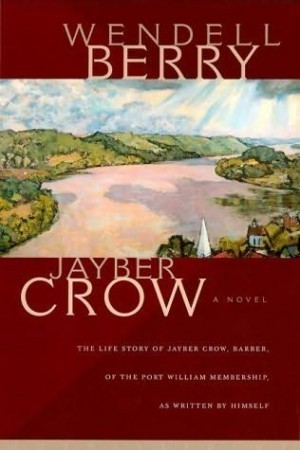 Someone once asked me to name a novel that had changed my life. I’m sure many books have changed my thinking, my opinions, my understanding of God or the world or myself; but my life? I took it to mean, “Name a novel that literally changed the way you spend your days, one that altered the shape of your story in way that you can actually put your finger on.”
Someone once asked me to name a novel that had changed my life. I’m sure many books have changed my thinking, my opinions, my understanding of God or the world or myself; but my life? I took it to mean, “Name a novel that literally changed the way you spend your days, one that altered the shape of your story in way that you can actually put your finger on.”
For me, that book was Jayber Crow, by Wendell Berry. The subtitle, The Life Story of Jayber Crow, Barber of the Port William Membership, as Written by Himself, may not exactly excite you because, let’s face it, who wants to read 384 pages about a barber? A small-town barber, no less?
If you’ve never read anything by Wendell Berry, you should know that he’s highly regarded as an essayist, a poet, and a novelist, and that all of his fiction is about the members of a small Kentucky community called Port William—a town loosely based on Berry’s own town of Port Royal. In the endpapers of some of the books there are maps and family trees of the imaginary township; I happen to know, for example, that after work Jayber would have passed Nathan Coulter’s house and then the Rowanberry farm on his walk down to the River, where he would have turned right to get home to his little river shack called Camp House. After 384 pages it feels like I know (and care) as much about Jayber as I do about anyone I’ve ever met. If you’re still not sure Port William is a place you’d like to visit, let me put it this way: imagine a whole series of stories about hobbits, and Port William is the Shire.
Jayber, an orphan and a bachelor, is a quiet man and a deep thinker, leading a peaceful and quiet life as well as he can as he observes and serves the community around him. Before he becomes the town barber, Jayber attends college and wrestles with some enormous theological questions. In one of the most memorable passages in the book he meets with his New Testament professor, a wise old man nicknamed “Old Grit.” Jayber tells him about his struggles with God, and the old man tells him:
“You have been given questions to which you cannot be given answers. You will have to live them out—perhaps a little at a time.”
“And how long is that going to take?”
“I don’t know. As long as you live, perhaps.”
“That could be a long time.”
“I will tell you a further mystery,” he said. “It may take longer.”
How many times I have wanted answers, when the only way to know them is to live them out in Grace.
I want to tell you about the tragic love story at the heart of the book, and about the painful and needless destruction of an ancient forest, but I’m out of space. I’ll end by saying this: I finished the book and literally wept on the floor of my office. Years later C. S. Lewis gave me a name for what I felt that day: sehnsucht. Joy, longing, yearning for something more, something unexplainable and terribly beautiful.
That day, after I blew my nose and washed my face, I started looking for land. I began thinking very seriously about community, and the Kingdom, and how best to instill in my children a love for Creation and for the people in our own Port William. We sold our house and moved to a little piece of land we call the Warren, and when people ask me how I got into beekeeping, or gardening, or seeing community as a way to enflesh the Kingdom on earth as it is in heaven, I hand them one of my copies of Jayber Crow.
September 2, 2014
A Christian Approach to “Nature vs. Nurture”
Christians often times buy into the simplistic categories of “nature vs. nurture.” But if we want to be more biblical, we should recognize that there are more distinctions than this, based on creation, sin, and grace.
In an article from several years ago David Powlison has a helpful footnote where he suggests four categories:
creation nature (our nature as the result of being created in God’s image)
sin nature (our nature as a result of falling into sin)
sin nurture (ways in which rebellion is modeled and encouraged)
grace nurture (ways in which godly behavior is modeled and encouraged).
We could schematize this as follows:
Nature
Nurture
Creation
creation nature
Sin
sin nature
sin nurture
Grace
grace nurture
Here is why this matters when analyzing our own behavior and in counseling others:
When it comes to explaining anger, biblical Christians don’t cast their vote with either “nature” or “nurture,” or even with “nature and nurture.”
The divide between good and evil runs through everything, so we discern four factors.
In sizing up the effects of “nature,” you can’t understand people without noting both creation-nature and sin-nature. . . .
Similarly, in sizing up the effects of “nurture,” we must pay attention both to sin-nurture and grace-nurture. Patterns of both sin and wisdom may be nurtured (Proverbs 13:20). Neither nature nor nurture are neutral.
This certainly doesn’t solve all of the debates, but I think these are helpful categories to keep in mind as we think about why we do what we do.
Source: David Powlison, “Anger Part 1: Understanding Anger,” The Journal of Biblical Counseling 14/1 (Fall 1995): 47 n. 23.
Alan Noble: A Novel Every Christian Should Consider Reading
 I am doing a blog series on Novels Every Christian Should Consider Reading.
I am doing a blog series on Novels Every Christian Should Consider Reading.
Alan Noble (PhD, Baylor University) is an Assistant Professor of English at Oklahoma Baptist University, Managing Editor at Christ and Pop Culture, and a Freelancer for The Atlantic. He and his family attend CityPres in OKC.
In 2006 Cormac McCarthy published one of his finest novels, The Road. It is a masterpiece of prose, at turns moving and terrifying, beautiful and gritty, transcendent and nihilistic. The novel tells the story of the end of the world after some unnamed cataclysmic event which blots out the sun, sets fires across the world, destroys cities, and ends society as we know it. McCarthy asks, what is left for us if we no longer have a culture to give us guidance and meaning?
To answer this, he tells the story of a nameless father and son as they travel south on a road toward warmer weather and the hope of finding other “good guys.” But this hope is irrational; the world they inhabit is violent and evil: bands of cannibals, steal, rape, and eat the weak, there is almost no food to be found, and there is no prospect of the world getting any better. In one pivotal scene, the boy’s mother tells the father that the ethical thing to do in such a world is to kill their young son before some great evil happens to him. And from a strictly secular perspective, she’s absolutely correct. When there is no future imaginable for anyone, why would you risk your son being horribly tortured? Following the logic of her own argument, the mother commits suicide.
Absurdly, the father refuses to murder his son. He retains a belief that his son has been given to him by God as a warrant of God’s existence and goodness. And by faith the father acts as if his son has a future worth living for, worth risking incredible suffering for, and the fantastic and fascinating thing is that McCarthy actually rewards that faith in the novel’s conclusion.
It’s difficult to express how remarkable this novel is. Modern readers expect a hopeless ending, an ironic ending, an ambiguous ending, or at best an ending that praises the human will to persevere in the face of a godless and hostile world, but McCarthy very intentionally validates the faith of his protagonist, a faith that is absurd from a secular perspective (for a lengthy treatment of this absurdity, see here).
One of the points made by Canadian Catholic philosopher Charles Taylor in his great work, A Secular Age, is that while religion remains popular, our society no longer assumes as a basic fact that the supernatural or transcendent is a reality which can affect us. Whether it is miracles in the Bible or God’s preserving common grace today, most modern people find it difficult to conceive of the supernatural. Ours is a largely disenchanted world, one in which we look inward for our hope and significance and direction, rather than outward toward a transcendent reality. And yet here is Cormac McCarthy, perhaps the foremost living American novelist, telling a story that acknowledges the weightiness of the secular vision (in the voice of the mother) and then denies that vision by validating a faith in the transcendent.
For those who can tolerate language, unsettling images of violence and suffering, and the even more unsettling moral questions that accompany those images, The Road is a rewarding and gripping read. And for the modern Christian reader, it is a moving reminder of the tension between secularism and faith that so strongly defines our time.
September 1, 2014
Leland Ryken: A Novel Every Christian Should Consider Reading
 I am doing a blog series on Novels Every Christian Should Consider Reading.
I am doing a blog series on Novels Every Christian Should Consider Reading.
Leland Ryken (PhD, University of Oregon) served as professor of English at Wheaton College for over 43 years. He has authored or edited over three dozen books—including Dickens’s “Great Expectations” in the Christian Guides to the Classics series and the forthcoming A Complete Handbook of Literary Forms in the Bible. He also served as literary stylist for the English Standard Version Bible.
Here he commends a novel he has read over thirty times.
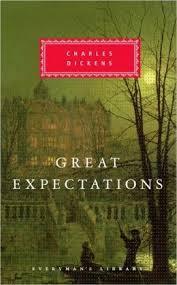 A magazine editor once invited me to join other contributors in answering the question, What is the best novel originally published in English? My answer began, The best novel originally published in English is Great Expectations by Charles Dickens.
A magazine editor once invited me to join other contributors in answering the question, What is the best novel originally published in English? My answer began, The best novel originally published in English is Great Expectations by Charles Dickens.
Great Expectations was recommended to me when I was preparing to go on my first Wheaton in England program. Through the years I have maintained that this novel is the best possible introduction to the people and places of England.
The Britishness of Great Expectations is related to my first commendation of the novel. The first thing we want when we sit down to read a novel is to be transported. Great Expectations delivers the goods. No fiction writer has excelled Dickens in the gift of world making. The world to which we are transported when we read Great Expectations is quintessential Britain and Victorian England. It is a world of nature and countryside, the small town, and London.
A second thing that we want when we commit ourselves to reading a novel is to be entertained. The hedonistic defense of literature (defending literature on the pleasure principle) has always carried primary weight with me. We read literature in our leisure time, and leisure is meant to be enjoyable. Great Expectations gives us the enjoyment that we want.
It is also a comic masterpiece. Among English authors, Dickens ranks with Chaucer and Shakespeare as our greatest humorist. His comedy is divided between comedy arising from characters and comedy arising from the situations of plot (“situation comedy”).
Dickens was a stylist and wordsmith of the very highest order, and he never excelled more than in Great Expectations (his last great novel). Dickens could make moments immortal by how he expressed them. His sparkling style is self-rewarding.
When I teach Great Expectations, I devote modules to each of the three elements that make up a story—setting, character creation, and plot. I stand at the board and ask my class to assemble the story qualities that the human race likes best in a story. By the time I have filled to board, it is obvious that Great Expectations meets all the criteria.
What the about truth of Great Expectations? One type of truth is truthfulness to human experience. A fiction writer gets us to stare at life, and the knowledge that emerges is knowledge in the form of right seeing—seeing things accurately. Virtually everything that Dickens portrays in Great Expectations ”gets it right” in its accurate rendition of human experience.
Where’s the edification? I myself place literature as a whole on a continuum with three main categories:
Christian literature
the literature of clarification and common humanity
the literature of unbelief
Great Expectations falls into the middle category. It does not explicitly endorse the Christian faith (though it contains many biblical references), but it is readily congruent with Christianity. In particular it raises the question of values in a helpful way. Pip loses his soul (metaphorically speaking) when he bases his life on his “great expectations” of a life of material ease based on inherited money, and he gains his soul (in a moral but not a spiritual sense) when he abandons his great expectations and bases his life on love, personal relations, and contentment with the common life.
August 31, 2014
What Would It Have Been Like to Attend a Puritan Worship Service?

The Old Ship Meetinghouse, built in 1681 (Hingham, Massachusetts). It is the only remaining 17th c. Puritan meetinghouse in the US and the oldest church in continuous ecclesiastical use in the US (now a Unitarian Universalist church).
Princeton historian Horton Davies (1916-2005):
A stranger entering any Puritan meeting-house would first notice the bareness and simplicity of the architecture and of the furnishings.
Probably the only decoration on the walls of the building would be text from the Scriptures.
Apart from the pews, the only other articles of furniture would be the high central pulpit and the Communion-table immediately below it.
On the cushion on the ledger of the pulpit would be seen the Bible. Its dominating, central position was no accident: it testified to the authority of the Bible in the worship, doctrine and government of Puritan Churches.
The impression of unadorned simplicity would be maintained at the worship.
The minister would ascend to the pulpit, dressed in a grave black gown, its somberness relieved only by the white of the Genevan bands he wore.
The service would commence with the call to worship, consisting of sentences selected from the Scriptures.
Then the stranger would kneel or stand, according to the practice of the congregation where he was worshiping, during the prayer of confession.
He would then join in a metrical psalm of praise.
The minister with then read a chapter from the Old Testament, perhaps pausing here and there to explain some obscure verse.
The stranger might then join in another metrical psalm, or he would hear a new testament lection immediately after the previous reading.
If you were in an Independent church he would then hear the minister lead a prayer of intercession. At its conclusion the whole assembly would ascent with a vocal ‘Amen’.
If you were in a Presbyterian church, this item would be postponed until after the sermon, and it would conclude with all saying the Lord’s Prayer aloud.
He would then notice the shuffling of the congregation as they settle down to listen comfortably to a lengthy sermon, while the minister adjusted the hour-glass. The sermon would be an exposition of a text or a longer passage of Scripture. It would begin with a simple exposition of Scripture, it would continue by controverting any errors which the Scripture condemned, it would conclude with the statement of the advantages of the acceptance of this particular doctrine. The preacher would deliver his conclusion with passionate and perhaps even vehement pleading. The stranger’s general impression of the sermon would be that both reason and conscience had been satisfied, and that the preacher had, in the name of God, struck for a decision. The peroration of the sermon would be the climax of the whole service. The service would then end with another metrical psalm and the pronouncing of the Blessing by the minister. . . .
In each service he would clearly have understood that the way of worship was not simply the manner in which the particular assembly of Christians wished to worship God, but rather that it was the kind of worship that God himself demanded in his Word. The lengthy readings from the Scriptures, the Baptismal formula taken from the Scriptures, the words of Institution and of Delivery taken from the Scriptures, the Biblical phraseology of the prayers, the careful way in which the sermon elucidated the Scriptures, and the metrical versions of the psalms used in praise, would all have contributed to produce this impression. In fact, it was the Biblical basis of Puritan worship that accounted for the liturgical agreement amongst the Puritans.
—Horton Davies, The Worship of the English Puritans (orig., 1948; reprint: Morgan, PA: Soli Deo Gloria Publications, 1997), 246-47.
See also, “What Did It Looks and Sound Like in Jonathan Edwards’s New England?” by Doug Sweeney. (Davies’s description applies to both England and New England in both the 17th and 18th centuries, while Sweeney is more specifically focused on 18th century New England.)
Louis Markos: A Novel Every Christian Should Consider Reading
 I am doing a blog series on Novels Every Christian Should Consider Reading.
I am doing a blog series on Novels Every Christian Should Consider Reading.
Louis Markos, professor in English and scholar in residence at Houston Baptist University, holds the Robert H. Ray Chair in Humanities.
His books include From Achilles to Christ (IVP), Heaven and Hell: Visions of the Afterlife in the Western Poetic Tradition (W&S), Apologetics for the 21st Century (Crossway), On the Shoulders of Hobbits: The Road to Virtue with Tolkien and Lewis (Moody), and Literature: A Student’s Guide (Crossway).
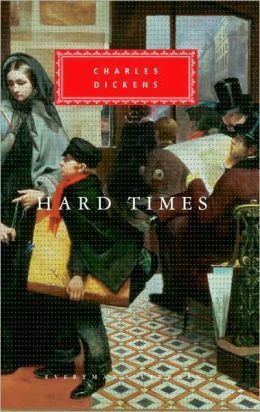 Not all of the novels of Charles Dickens are 800 pages long! In fact, my favorite Dickens novel, Hard Times, comes in just under 300 pages. Its relatively short length likely has to do with its simple, parable-like structure. As the titles of its three books (“Sowing,” “Reaping,” “Garnering”) make clear, Hard Times illustrates and dramatizes the biblical teaching that we reap that which we sow.
Not all of the novels of Charles Dickens are 800 pages long! In fact, my favorite Dickens novel, Hard Times, comes in just under 300 pages. Its relatively short length likely has to do with its simple, parable-like structure. As the titles of its three books (“Sowing,” “Reaping,” “Garnering”) make clear, Hard Times illustrates and dramatizes the biblical teaching that we reap that which we sow.
Which is not to say that the novel is schematic or overly moralistic. The characters that Dickens creates are flesh-and-blood people who make agonizing decisions, and for whom we come to care deeply. The flawed protagonist, Thomas Gradgrind, is a retired merchant who runs a model school that trains children to think only in terms of facts. Employing the same utilitarian educational system for his eldest son (Tom) and daughter (Louisa), he forbids them to read poetry or fiction and roots out of them all fanciful, romantic, or heroic notions.
Though Gradgrind is neither a bad man nor an uncaring father, his failure to nurture his children’s hearts and souls has disastrous results; both Tom and Louisa grow up to be stunted adults devoid of real human feeling. Lacking not only a moral center but the kinds of feelings that must ever accompany virtuous behavior, Tom, without suffering a stitch of remorse, first manipulates his doting sister and then robs a bank and frames the crime on an innocent worker. When his father asks him why he has done these terrible things, Tom appeals to the law of averages: given so many workers, so many are bound to be dishonest. Sadly, tragically, Gradgrind must see the bitter fruit of his utilitarian ideals.
The true heart of the novel, however, concerns Louisa’s disastrous marriage to a filthy capitalist, Bounderby, who is thirty years her senior. When Gradgrind passes on Bounderby’s proposal to Louisa, she desires to share with her father what is in her heart but neither of them knows how to communicate on an emotional level. Though they both know Louisa does not love Bounderby, Gradgrind brushes this aside, counseling her to make her decision based on facts and statistics. Her marriage is a loveless one, leaving the emotionally immature Louisa prey to an amoral rake, with whom she nearly runs off.
At the last second, she relents (this is, after all, a Victorian novel!), and, instead, runs home to her father’s house. He greets her at the door, only to have her fall, in an insensible heap, at his feet. Although Gradgrind is humbled by the experience and comes to realize that there was something missing in his educational scheme, he proves unable to mend the damage that has been done. Bounderby rejects Gradgrind’s plea to give Louisa some time apart from him and casts her aside for good. Louisa never remarries and lives as a childless, isolated spinster.
The fates of Gradgrind, Tom, and Louisa might suggest that Hard Times is a gloomy novel, but Dickens is careful to contrast their stories with that of a troupe of circus people who, though they lack facts, are rich in love, warmth, and joy. Through them Dickens teaches us that there are aspects of our lives and ours souls that cannot be so easily weighed and measured.
August 30, 2014
Lore Ferguson: A Novel Every Christian Should Consider Reading
 I am doing a blog series on Novels Every Christian Should Consider Reading.
I am doing a blog series on Novels Every Christian Should Consider Reading.
Offering a recommendation today is Lore Ferguson, a writer and graphic designer living in Dallas, TX. She describes her life as “small, simple, and ever in an ongoing effort to make it more so.”
She writes at sayable.net and can be followed on Twitter at @loreferguson.
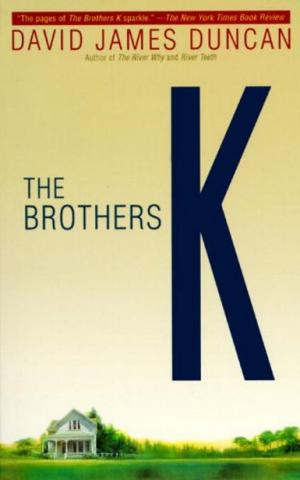 If you have anything good to say about a particular book, you ought to at least have a few good things to say about its plot as well. Whenever I recommend my favorite particular book, I’m asked: “What is it about?” The words catch—sometimes on the end of my tongue, sometimes in the back of my throat—because the truth is I don’t know.The Brothers K (not to be confused with The Brothers Karamazov, which it will be anyway) is a book about a family, and this is how I recommend it in a singular sentence. It is a book about the family Chance, as told by one of four Chance brothers, Kincaid. I heard of
If you have anything good to say about a particular book, you ought to at least have a few good things to say about its plot as well. Whenever I recommend my favorite particular book, I’m asked: “What is it about?” The words catch—sometimes on the end of my tongue, sometimes in the back of my throat—because the truth is I don’t know.The Brothers K (not to be confused with The Brothers Karamazov, which it will be anyway) is a book about a family, and this is how I recommend it in a singular sentence. It is a book about the family Chance, as told by one of four Chance brothers, Kincaid. I heard of
The Brothers K from an author friend who had named his son after Kincade. I knew then I must have missed the great American novel as an English major while under piles of Gilgamesh and Shakespeare, for which I will never forgive my professors.
Paul says whatever is good and true and pure, to think on these things, and I know he meant it, but sometimes I wonder if that meant we were never to think of the evil, untrue, and defiled things that pass to and fro beneath the front we offer everyone else. The truth is there is evil and defilement in my heart, and I must think on those things to lead me to the kindness of God on the way to repentance. David James Duncan simmers the brokenness of family, heart, war, and world in this 645-page novel, and never boils it over. There is not gratuitous delight in brokenness, but there is neither a turning away of the things that break us all.
The tension holding the book together is the voice of Kincaid, growing into adulthood, processing and reprocessing the life he’s been born into and the life he eventually chooses. But the real tension is that the reader will see himself there in the questions Kincaid asks and the ones that are asked of him, the observations we all make but are afraid to say.
Like many a Christian before them, Mama and the Elder justified their machinations with Christ’s famous sentence: ‘I came not to send peace, but a sword.’ And like many a Christian before them, they completely forgot that the only sword-shaped weapon Jesus ever actually used was the one He died on.
Some might see observations like these as gratuitous jabs against Christianity, and I might agree, but gratuitous jabs are the fully-grown progeny of doubts never voiced.If you read it slowly, and finish it well, you will have grown alongside the Chance family, asking existential questions and mulling on philosophical differences, but you will also have grown to love them. This is why The Brothers K is a book Christians ought to read (though I’m wary of saying must read).
We all have people in our lives who challenge and press on us in uncomfortable ways and places, but it is not by chance they are there. They are, in one very real sense, family. These bipeds we pass in grocery stores and though church doors—more than mere humans taking up space, they carry the weight of abuse, fear, doubt, hope, joy, peace, and death on their shoulders. One of the brothers K says:
I felt free to like all three of these men now, because I’d realized I didn’t have to become them.
Would that we all could say those words.
August 29, 2014
David Powlison: A Novel Every Christian Should Consider Reading
 I am doing a blog series on Novels Every Christian Should Consider Reading.
I am doing a blog series on Novels Every Christian Should Consider Reading.
David Powlison worked for four years in psychiatric hospitals, during which time he came to faith in Christ. He teaches at the Christian Counseling and Education Foundation, where he is executive director, and edits The Journal of Biblical Counseling. He hold an MDiv from Westminster Theological Seminary and a PhD from the University of Pennsylvania in the history of science and medicine (focusing on the history of psychiatry), and has been a counselor for over 30 years.
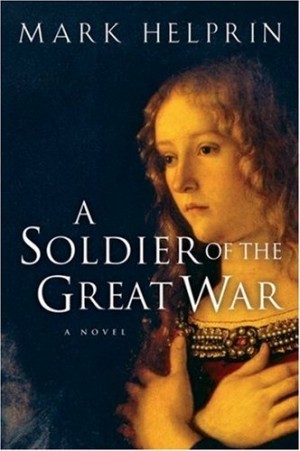
Mark Helprin’s A Soldier of the Great War (1991) is book every reading Christian should consider.
In making this recommendation, I am taking seriously that the verb is “should consider,” not “should read.” This novel is not for everyone. It’s long (almost 800 pages). Helprin’s style (magical realism) won’t appeal to some people. You won’t find Christian theology. This is purely a work of fiction. It tells the story of a very interesting man. It does not present opinions, views, and advice. That’s the disclaimer.
But here’s the draw. A Soldier of the Great War is beautiful. It is thought-provoking.
I know that many readers will find that Helprin’s writing gives the same deep pleasure and rich nourishment that he has given me over the years. I have read SGW four or five times. (Only Fyodor Dostoevsky and Patrick O’Brian have drawn me back so often.) Each time I have been enraptured. My copy of the book is marked up with innumerable underlinings, annotations, and cross-references. I love Helprin’s lyricism and imagination. I love his reflections on and evocations of beauty, love, joy, worship, courage, coming of age, passion, loss, and death.
Beauty, joy, and love—in the face of death—are the core. We Christians are right to take seriously “the true and the good,” those life-or-death questions dealing with epistemological convictions and ethical actions. We are not right to ignore or even deprecate “the beautiful,” those life-or-death questions dealing with aesthetic experience. But worship and God’s glory involve all three.
God is true. He is good. He is beautiful.
Sin corrupts all three; grace redeems all three. Helprin does not write as a Christian. But he awakens things that stream in the direction of whole-souled worship. Not worship abstracted and detached from God’s working in time and place and persons. But worship awakening in the midst of human experience, embedded in creation, history, and relationships. SGW traffics in immediacy, wonder, engagement, joy, attachment, awe, attentiveness, gratitude, alertness, appreciation, longing.
Of course, I love SGW in a different way than I love Scripture. But alongside Scripture, I most love novels and histories. Why? Because you learn about people.
You gain a feel for human experience.
You come to understand riches and nuances that you could never understand just from knowing the circle of people you happen to know.
You come to understand the ways that people differ from each other, and the ways we are all alike—an exceedingly valuable component of wisdom.
You become a bigger person with a wider scope of perception.
All those things you come to know illustrate and amplify the relevance and wisdom of our God. I love fiction and biography for the same reasons that an 18th century pastor would read his Bible and his Shakespeare. SGW is one those stories from which I have loved learning.
August 28, 2014
Kathy Keller: A Novel Every Christian Should Consider Reading
 Today I am beginning a new blog series on Novels That Every Christian Should Consider Reading. Only the Bible is a “must read,” so put these in the category of “should consider reads.” Over the next couple of weeks I will post one or two entries a day.
Today I am beginning a new blog series on Novels That Every Christian Should Consider Reading. Only the Bible is a “must read,” so put these in the category of “should consider reads.” Over the next couple of weeks I will post one or two entries a day.
The first contributor is Kathy Keller.
Kathy holds an MA in theological studies from Gordon-Conwell Theological Seminary, has worked as an editor for Great Commission Publications, and presently serves on the staff of Redeemer Presbyterian Church in Manhattan, where her husband, Tim, is senior pastor. In Redeemer’s early years, Tim preached and Kathy was the entire staff; now she serves as assistant director of communications.
Kathy writes below about a series of books—which can also be considered one long novel—that will leave you “forever dissatisfied with poorly written fiction.”
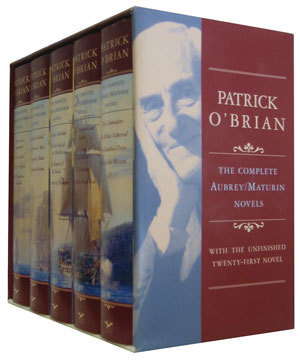 Patrick O’Brian, the author of the 20-book series of Aubrey-Maturin stories set in the Royal Navy during the Napoleonic wars, was famously reticent about his personal life. Judging by the competing narratives that came to light shortly before and after his death, it was a complex one. Following C. S. Lewis in The Personal Heresy, I do not care a whit. The man could write a story.
Patrick O’Brian, the author of the 20-book series of Aubrey-Maturin stories set in the Royal Navy during the Napoleonic wars, was famously reticent about his personal life. Judging by the competing narratives that came to light shortly before and after his death, it was a complex one. Following C. S. Lewis in The Personal Heresy, I do not care a whit. The man could write a story.
If it would not be a breach of contract, I would stop writing here and re-direct any reader to David Mamet’s piece in the New York Times along with George Will’s retrospective in the Washington Post and consider my duty done.
Mamet’s and Will’s admiration was reserved for a writer who could tell a good story, and in this they regard Patrick O’Brian as one of the masters. The long tale of Jack Aubrey and Stephen Maturin’s friendship, adventures, marriages, successes, humiliations, strengths, and weaknesses is one that will become a part of you. The follies and glories of human nature are recorded with humor, insight, and tenderness. I often think that if I am confined to bed in my dotage, I will ask to have my favorite books, whom I think of as friends, stacked up in bed with me, just to handle and hug to myself, as Mamet said.
I stumbled across the O’Brian books one summer when I was looking for a cache of books to take on vacation. No trip could rightfully be called a vacation unless I had at least half a dozen unread books to pack among the bathing suits and sunscreen. I was particularly delighted to discover what looked like a good writer with a long tail—meaning he had already written a LOT of books, so that if I did discover that I liked his writing, there would be no waiting for the next installment to come out.
Ha!
I bought three, just to give them a fair trial, and by the middle of our second week away I was calling back to the bookstore in NYC and begging them to FedEx the next five or six in the series so I wouldn’t run out before we returned. Since then I have read all 20 four times through, and am about to embark on another marathon.
I am completely ignorant of sailing in all its incarnations (ancient, modern, recreational, naval, etc). As O’Brian has made use of historical diaries and letters, as well as mastering the sailing jargon himself, each story is liberally peppered with “loosening the foretopsail” and “shipping the capstan-bars,” and other nautical expressions. As Stephen Maturin, physician, spy, and friend of Captain Jack Aubrey, is also an unreconstructed landsman, this should not be an impediment to enjoyment of the story. If you do happen to understand sailing terms, so much the better for you.
Critics rightly regard all 20 books as one long story. So make no mistake: I am not recommending ONE novel to you, but the entire series. To my friends with whom I have waxed passionate about their joys and perfections, and who have tried to get interested and failed, I can only say “You didn’t give it long enough.” Like people who say they just can’t get into The Lord of the Rings, you just have to take it on the word of people you trust that if you get into the rhythm of the writing, the use of language, the overarching story arc, and most of all, the friendship (LOTR and PO’B) you will be drawn in, enriched, entertained, changed, and made forever dissatisfied with poorly written fiction.
Justin Taylor's Blog
- Justin Taylor's profile
- 44 followers


